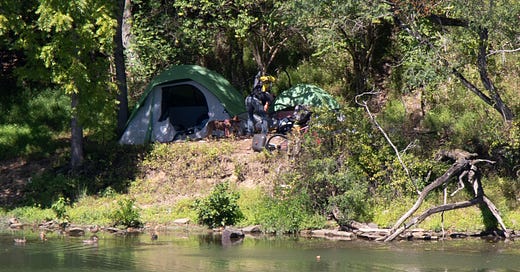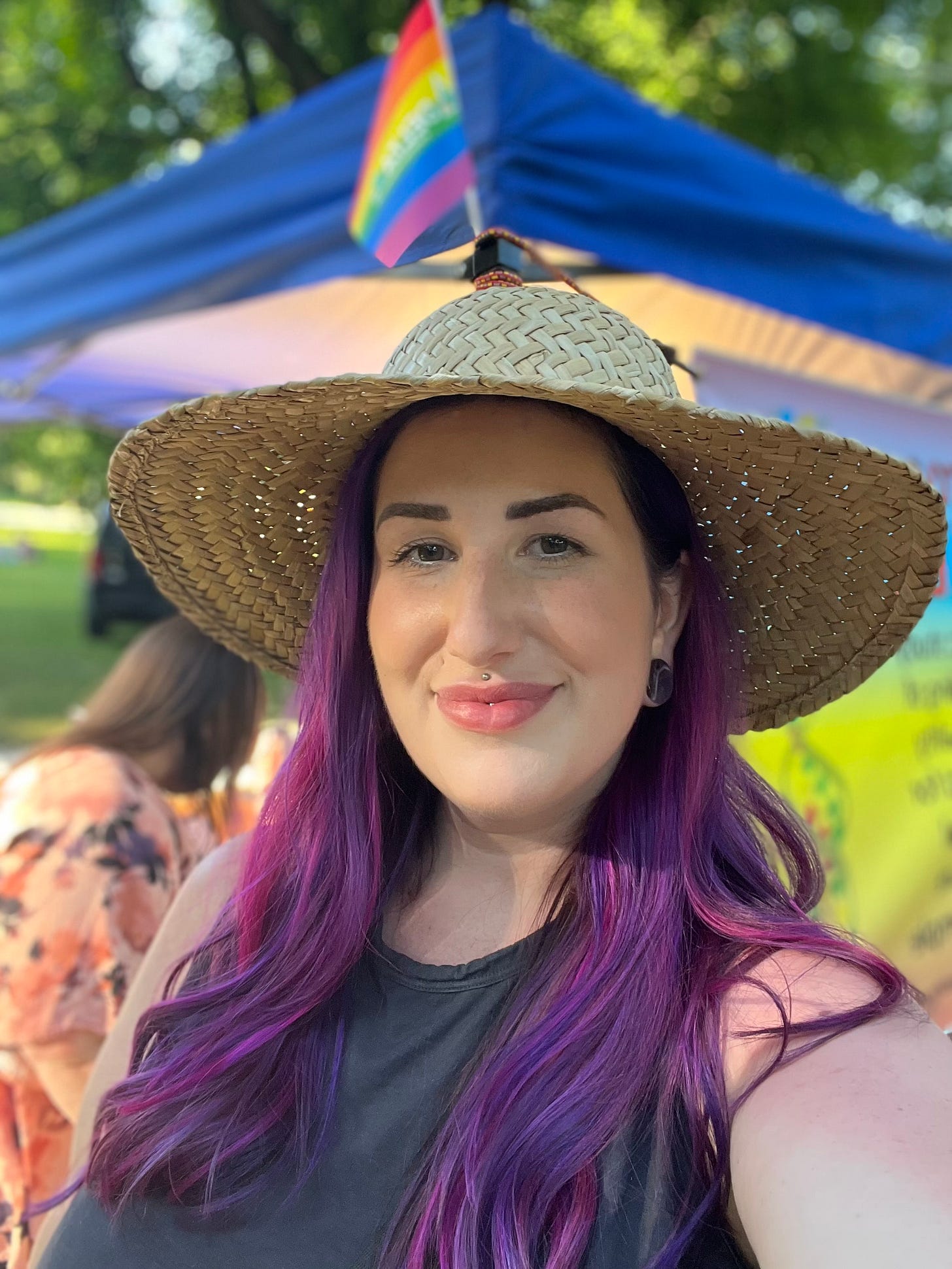Morgantown bans sleeping, storing personal belongings on public property
Despite overwhelming opposition from members of the community, service providers and medical professionals, Morgantown’s city council voted 4-3 to ban urban camping.
MORGANTOWN — In a highly anticipated vote, the Morgantown City Council, just after midnight Sept. 4, narrowly voted to approve a total ban on urban camping in the city. Morgantown joins Huntington, Parkersburg, Westover and Wheeling in criminalizing the act of sleeping or storing personal belongings on public property.

Mayor Joe Abu-Ghannam, Councilor Danielle Trumble and Councilor Brian Butcher voted against the ban, with Deputy Mayor Jennifer Selin, Councilor Bill Kawecki, Councilor Louise “Weez” Michael and Councilor Dave Harsbarger supporting it.
Effective Oct. 4, the ban prescribes written warnings on a first offense, a fine of up to $200 on a second offense and a fine of up to $500 and/or a 30-day prison sentence for third and further offenses. Alternative sentencing can occur when a person accepts help coordinating treatment for substance use disorders, mental health or housing.
It’s unclear how, or if, Morgantown will enforce the new ban.
The vote comes just two months after the Supreme Court of the United States ruled that civil and criminal penalties against urban camping do not constitute ‘cruel and unusual punishment.’
Two citizens spoke in support of the legislation, saying they don’t feel safe downtown or along the city’s rail trail, that their children are exposed to drugs and that trash issues are widespread. A further two citizens gave no clear indication of support or opposition.
Over two dozen people spoke against the ordinance, including service providers, medical professionals, mental healthcare providers and activists, urging council to hit pause on what they called “rushed process.” Concerns over a lack of affordable housing, inadequate access to shelter beds and concerns that enforcement could further impact homeless people’s ability to obtain housing due to the ban’s penalties.
Several opponents pointed to Morgantown code addressing blocking right-of-ways, public nuisances, littering and drug use—many of the issues proponents of the ban say will be solved by the legislation. Others spoke of citizen plans to push for a repeal petition.
Mollie Kennedy, Community Outreach Director for the American Civil Liberties Union of West Virginia, said her organization would “continue monitoring this council’s actions” signaling a potential for legal action. Lesley Nash, staff attorney for Mountain State Justice, cited several areas of the ordinance she considered vague. Her colleague Lindsey Jacobs, Advocacy and Access Program Director, warned council that the city’s adoption of their urban camping ban will lead to lawsuits.
New names, but familiar faces…


Council slowed down their efforts to ban urban camping to allow Catholic Charities West Virginia time to open their emergency triage shelter. Their first operating day was Tuesday, Sept. 3, the morning before Morgantown councilors approved their ban.
The site, located within Hazel’s House of Hope, sits in the mountains along U.S. 119 and Interstate 68, is located four miles from downtown. Mountain Line Transit Authority currently offers a free bus to Hazel’s House, but many in the community say the moving services out of downtown to U.S. 119 was a mistake, including former mayor Ron Dulaney, Jr.
This is a first for the organization, said Mark Phillips, President and CEO of Catholic Charities West Virginia. “We don’t operate any other full-time, year-round shelter anywhere in West Virginia,” Phillips told Wheeling Free Press. “It’s nerve-wracking for us…but, it’s clearly really in line with our mission of trying to serve the most vulnerable West Virginians.”

The 30-bed shelter offers emergency services to people facing homelessness. Still, Phillips said it’s not an adequate solution for chronic homelessness. “It’s not built for that,” Phillips said. “An emergency triage shelter is just a place to sleep. It’s intended to, hopefully, quickly transition people to permanent housing.”
Despite the shelter’s alignment with Catholic Charities West Virginia's mission, Phillips said urban camping bans do not work. “These policies are ineffective, they’re expensive and, in many cases, actually worsen homelessness.” The City of Morgantown and Monongalia County have already expended $165,000 each to help fund the new triage shelter.
“Putting in a camping ban makes it harder for the people living on the streets. It pushes individuals out to other communities on the periphery that don’t have the kind of services Morgantown does,” Phillis said. “It’s not a good strategy and it won’t work.”
Phillips called for more state and federal funding to help municipalities who, in his words, are not equipped to handle the situation. “To decide that you can have a couple public hearings and then put in a camping ban—it just doesn’t make any sense,” Phillips said. “We have part-time councilors, mayors, whatever, just deciding to enact a system that no expert on issues of homelessness recommends.”
Of its 30 beds, the shelter already has six clients on its first day. Phillips said the goal is to increase capacity to 15 by mid-September. He predicts by the end of September, the Catholic Charities West Virginia emergency triage shelter will be at- or near-capacity. It joins The Rainbow House as the only dedicated homeless shelters in Morgantown. The facilities have a combined 60 beds, far less than the estimated 120 people experiencing homelessness on any given night.
Operating at capacity…
The Rainbow House is a project by Project Rainbow. Since November 2023, the shelter has provided safe refuge prioritizing unhoused people who are part of the LGBTQ+ community, but they will accept non-LGBTQ+ members as well. With 26-beds available, Erin Shelton, Project Coordinator for The Rainbow House, said 22 were occupied as of Sept 3.
During Morgantown’s Aug. 20 council meeting, Councilor Michael stated 270 beds exist in the city for unhoused people to access; however, these numbers include mental health and substance use treatment beds—many of which have prescribed time limits, require health insurance or have restrictions for who can access their services.
“Those systems themselves are overburdened and they are also not equipped to deal with people who have nowhere to go after the program is over,” Shelton said. “Those are not permanent solutions. They put these [bed lists] out there without knowing the reality of what it takes to get someone into one of those facilities, what the eligibility requirements are, what kind of health insurance they need to have.”
With The Rainbow House operating near-capacity and Phillips expecting the Catholic Charities West Virginia emergency triage center to operate at- or near-capacity by the end of September, Shelton said it’s unclear where people will go once shelter beds fill up. “I truly do not know,” Shelton said. “I think that’s a question that we’ve been trying to pose to the city council as the weeks have gone on.”
Councilors have offered the city’s hospital system as a cure to a lack of beds, but this spawns further complications. “If you take them to the hospital, they’re going to be back on the streets the next day,” Shelton said.
WVU Medicine has, allegedly, been sending discharged patients to shelters across the state, Shelton said. “Shelters in other places in the state have started refusing people from Ruby because they’re sending so many,” Shelton said. “Ruby is inundated with people who have nowhere to go…and they have to discharge some of them to the streets."
The Rainbow House advocates for housing-first solutions. In recent weeks, three of their clients have achieved housing. “It does feel good,” Shelton said. “Those are the wins we definitely hold on to, especially in the face of stuff like the camping ban.”
Activists plan next steps…
Morgantown is home to the state’s largest university–West Virginia University. It’s also one of the few West Virginia municipalities experiencing population growth. These issues combined have caused the cost of renting and purchasing a home to skyrocket, said Anna Saab, leader of the Morgantown Coalition for Housing Action, or MoCHA.
The nonprofit organization consists of several organizations and leaders throughout the city with the goal of “bridging the gaps in advocacy and resources” for people in Morgantown. This includes professionals in the legal field, social services and medical professionals.
“It’s no secret that it’s super, super expensive to live in Morgantown,” Saab said. “A lot of folks, frankly, are just getting priced out of the market. They’re unable to afford housing on their disability benefits or retirement pension, for example.” Saab told a story of an elderly person who lived in their car after they were unable to afford their rent. “Something that’s really important to understand is that a lot of us are closer to becoming unhoused than we want to admit or even realize,” Saab said.
Saab said Morgantown city councilors haven’t listened to experts or their constituents. “We feel confident that this is not a popular measure,” Saab said. “There is a loud minority of people who are supporting this measure. Unfortunately, their voices are louder because they’re property owners.”
When asked what she would prefer to see the city council do to help unhoused people, Saab answered “build housing. There needs to be a massive effort on the part of city council to build. The only thing that’s going to make someone no longer houseless is providing them with housing.”
Since Aug. 20, MoCHA has collected over 500 signatures in opposition to the ban. Saab said their efforts to fight the ban are just beginning, too.
“We plan to file for a referendum for repeal,” Saab said. “We plan to get boots on the ground from the get go so that we can hopefully be successful in gathering the number of signatures that we need to repeal it.”
Ordinances can be repealed by capturing 10% of qualified voters registered to vote at the last municipal election, per Morgantown’s website. Petitions must be submitted to the City Clerk’s office within 30 days of an ordinance’s adoption. If a petition is verified, councilors must repeal the ordinance or send the question to the voters.

Morgantown’s ban on urban camping won’t take effect until Oct. 4. Until then, it’s likely service providers will scramble to locate unhoused people throughout the city and attempt to find them shelter. It’s still unclear how, or if, the city will enforce its ban.





